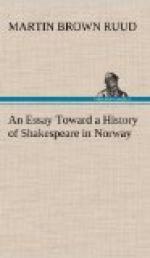The spirit of these translations is obvious enough from the opening sentence of Madhus’ preface to his translation of Macbeth:[27] “I should hardly have ventured to publish this first attempt at a Norwegian translation of Shakespeare if competent men had not urged me to do so.” It is frankly declared to be the first Norwegian translation of Shakespeare. Hauge and Lassen, to say nothing of the translator of 1818, are curtly dismissed from Norwegian literature. They belong to Denmark. This might be true if it were not for the bland assumption that nothing is really Norwegian except what is written in the dialect of a particular group of Norwegians. The fundamental error of the “Maalstraevere” is the inability to comprehend the simple fact that language has no natural, instinctive connection with race. An American born in America of Norwegian parents may, if his parents are energetic and circumstances favorable, learn the tongue of his father and mother, but his natural speech, the medium he uses easily, his real mother-tongue, will be English. Will it be contended that this American has lost anything in spiritual power or linguistic facility? Quite the contrary. The use of Danish in Norway has had the unfortunate effect of stirring up a bitter war between the two literary languages or the two dialects of the same language, but it has imposed no bonds on the literary or intellectual powers of a large part of the people, for the simple reason that these people have long used the language as their own. And because they live in Norway they have made the speech Norwegian. Despite its Danish origin, Dano-Norwegian is today as truly Norwegian as any other Norwegian dialect, and in its literary form it is, in a sense, more Norwegian than the literary Landsmaal, for the language of Bjornson has grown up gradually on Norwegian soil; the language of Ivar Aasen is not yet acclimatized.
[27. William Shakespeare:
Macbeth. I norsk Umskrift ved Olav
Madhus. Kristiania. 1901.
H. Aschehoug & Co.]
For these reasons it will not do to let Madhus’ calm assertion go unchallenged. The fact is that to a large part of the Norwegian people Lassen’s translations represent merely a slightly Danicized form of their own language, while to the same people the language of Madhus is at least as foreign as Swedish. This is not the place for a discussion of “Sprogstriden.” We may give full recognition to Landsmaal without subscribing to the creed of enthusiasts. And it is still easier to give credit to the excellence of the Shakespeare translations in Landsmaal without concerning ourselves with the partisanship of the translator. What shall we say, then, of the Macbeth of Olav Madhus?




